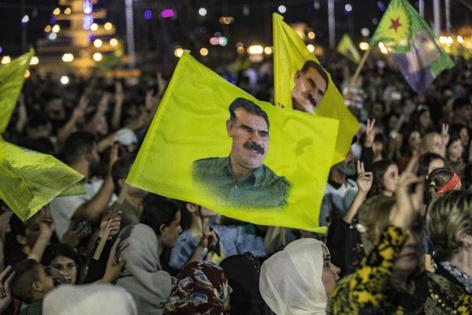Kurdish militants burn arms to mark end of war with Turkey
Published in News & Features
The Kurdish militant group PKK started laying down its weapons, marking the beginning of a disarmament process aimed at ending one of the Middle East’s longest-running insurgencies.
A group of 30 fighters from the Kurdistan Workers’ Party burned their weapons at a ceremony in Iraq’s semi-autonomous Kurdish region attended by observers from Turkey, Iraq’s central government and the Kurdistan Regional Government, local TV channels showed.
The handover will be the first concrete step toward disarmament since the PKK’s May announcement that it would disband, ending four decades of conflict with the Turkish state and easing security concerns in the region.
Peace could also boost Turkey’s economy, with policymakers saying that the conflict has cost the country around $1.8 trillion including lost opportunities due to military spending. Bloomberg Economists estimated the cost of the conflict as $500 billion.
The Turkish government views Friday’s announcement as an irreversible turning point in the disarmament process, according to a senior Turkish official, who asked not to be identified due to the sensitivity of the matter. Soon, authorities will put in place a mechanism for legal and social reintegration of PKK militants to support reconciliation efforts, the official said.
Devlet Bahceli, the nationalist ally of President Recep Tayyip Erdogan who first called for reconciliation late last year, said the developments were significant not just for Turkey but also the region. The process began with Bahceli’s call last October and at that time it came as a surprise given his Nationalist Movement Party’s historically hardline stance toward the Kurds and its vocal opposition to previous peace efforts.
It remains unclear whether all armed PKK factions will participate in the process. Turkey’s government has called for it take no longer than five months.
The group, which first took up arms in 1984 seeking Kurdish autonomy, is designated a terrorist organization by Turkey, the U.S. and the European Union. The conflict has killed more than 40,000 people, with violence at times spilling into neighboring Iraq, Syria and Iran.
While the PKK has remained largely inactive inside Turkey in recent years, its affiliates have gained control of parts of northern Syria amid the country’s civil war.
The U.S. views the YPG, a Kurdish militia that forms the backbone of the Syrian Democratic Forces, as a key ally in the fight against Islamic State. Turkey, by contrast, considers the group a security threat due to its ties to the PKK. Washington has recently pushed for the Syrian Democratic Forces to be integrated into the newly formed Syrian army.
In a video message released Wednesday, the PKK’s imprisoned leader Abdullah Ocalan described the handover as “transition from the phase of armed conflict to the phase of democratic politics and law.” He has been serving a life sentence in solitary confinement on the prison island of Imrali since 1999.
The motivations behind the PKK’s decision to disband remain murky. Turkish and Kurdish officials have not publicly detailed what led to the breakthrough.
In his initial message back in May, Ocalan demanded for greater recognition of Kurdish identity and culture in Turkey’s constitution, the right to education in the Kurdish language. Kurdish politicians have echoed those calls.
How far Erdogan’s government is willing to go to meet those aspirations still isn’t clear. Ankara has not formally agreed to any of the demands.
The Turkish President is expected to deliver a “historic speech” on Saturday morning, AK Party spokesman Omer Celik said, without elaborating.
---------
—With assistance from Beril Akman.
©2025 Bloomberg L.P. Visit bloomberg.com. Distributed by Tribune Content Agency, LLC.







Comments